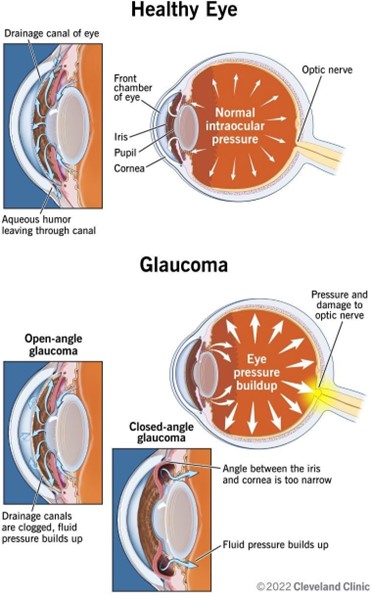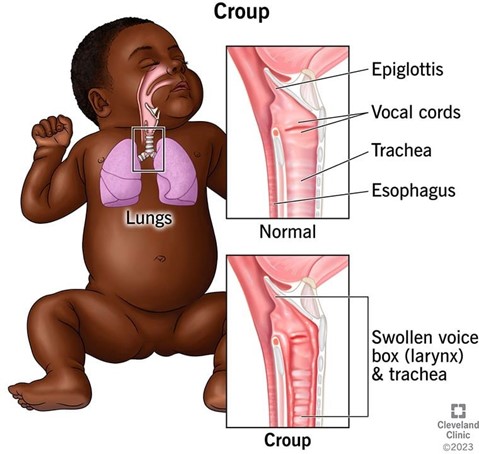The practical nurse (PN) is reviewing a client's recent ophthalmic screening test results. Findings of optic neuropathy, loss of peripheral vision, and increased intraocular pressure are consistent with which medical condition?
Glaucoma.
Macular edema.
Cataract.
Diabetic retinopathy.
The Correct Answer is A
Glaucoma is a group of eye diseases that damage the optic nerve and cause vision loss. It is often associated with increased intraocular pressure, which can compress the nerve fibers and reduce blood flow to the retina. The most common type of glaucoma, open-angle glaucoma, causes gradual loss of peripheral vision.

The other options are not correct because:
A. Macular edema is a condition that causes swelling and fluid accumulation in the macula, the central part of the retina that is responsible for sharp and detailed vision. It can cause blurred or distorted vision, but it does not affect the optic nerve or the peripheral vision.
B. Cataract is a condition that causes clouding of the lens, which is the transparent structure that focuses light onto the retina. It can cause blurred, dim, or yellowed vision, but it does not affect the optic nerve or the intraocular pressure.
C. Diabetic retinopathy is a complication of diabetes that damages the blood vessels in the retina and causes bleeding, leakage, or scarring. It can cause blurred, fluctuating, or darkened vision, but it does not affect the optic nerve or the intraocular pressure.
Nursing Test Bank
Naxlex Comprehensive Predictor Exams
Related Questions
Correct Answer is C
Explanation
Croup is a respiratory infection that causes inflammation and narrowing of the airway, resulting in a barking cough, hoarseness, and stridor. The PN should monitor the child's oxygen saturation level via pulse oximetry, as it can indicate the severity of the airway obstruction and the need for supplemental oxygen or other interventions.

The other options are not correct because:
A. Instructing the mother to play with the child for stimulation and distraction may worsen the child's condition, as it can increase his respiratory demand and anxiety.
B. Administering a dose of acetaminophen as needed may help reduce fever or pain, but it does not address the underlying cause of croup or improve airway patency.
D. Encouraging the child to drink adequate amounts of fluids may help prevent dehydration and thin the secretions, but it does not relieve the inflammation or narrowing of the airway.
Correct Answer is D
Explanation
This is the best action that describes the responsibility of the PN because it ensures that the client has given informed consent for the invasive examination and that the consent form is valid and documented. The PN should verify that the provider has explained the examination, its risks and benefits, and alternative options to the client and that the client has agreed to proceed.
A. Explaining the examination and asking the client to sign the consent form is not the responsibility of the PN but of the provider who will perform the examination.
B. Obtaining the medical record for the correct signed consent form prior to the examination is not enough to ensure informed consent and may not involve any interaction with the client.
C. Asking if the client understands the exam and why the consent form must be signed is not enough to ensure informed consent and may not address any questions or concerns that the client may have.
Whether you are a student looking to ace your exams or a practicing nurse seeking to enhance your expertise , our nursing education contents will empower you with the confidence and competence to make a difference in the lives of patients and become a respected leader in the healthcare field.
Visit Naxlex, invest in your future and unlock endless possibilities with our unparalleled nursing education contents today
Report Wrong Answer on the Current Question
Do you disagree with the answer? If yes, what is your expected answer? Explain.
Kindly be descriptive with the issue you are facing.
